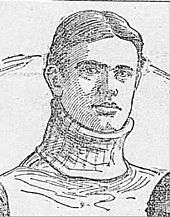Wild Bill Claiborne
|
Claiborne depicted c. 1900 | |
| Sewanee Tigers | |
|---|---|
| Position | Guard |
| Class | Graduate |
| Career history | |
| College | Sewanee (1899–1900) |
| Personal information | |
| Date of birth | December 11, 1872 |
| Place of birth | Amherst County, Virginia |
| Date of death | January 7, 1933 (aged 60) |
| Place of death | Florida |
| Height | 6 ft 0 in (1.83 m) |
| Weight | 190 lb (86 kg) |
| Career highlights and awards | |
| |
William Stirling "Wild Bill" Claiborne (December 11, 1872 – January 7, 1933) was a college football player and reverend.
College football
Claiborne was a prominent guard for the Sewanee Tigers of Sewanee:The University of the South, a small Episcopal school in the mountains of Tennessee. He played on the 1899 "Iron Men" who won five road games in six days and all by shutout,[1] selected All-Southern.[2] Claiborne was blind in one eye, and used his discolored eye for purposes of intimidation on the field.[1][3][4] At Sewanee Claiborne studied theology.[1]
Religious work
He was a member of the Missionary Society.[1] He was called the "apostle of the mountain folk" for his work among Tennessee mountain people.[1] He founded the St. Andrew's School for Mountain Boys, refounded St. Mary's School, and established Emerald-Hogston Hospital.[1] Claiborne wrote a book titled Boy in the Mountains.[1][5]
References
- 1 2 3 4 5 6 7 Wendell Givens (2003). Ninety-Nine Iron: The Season Sewanee Won Five Games in Six Days. University of Alabama Press. pp. 32; 121.
- ↑ "An All-Southern College Eleven". Orange and Blue.
- ↑ Richard Scott. SEC Football: 75 Years of Pride and Passion. p. 22.
- ↑ Randy Horick. "A Winner's Tale".
- ↑ "The Literature of Missions". Forth. 81: 721.
